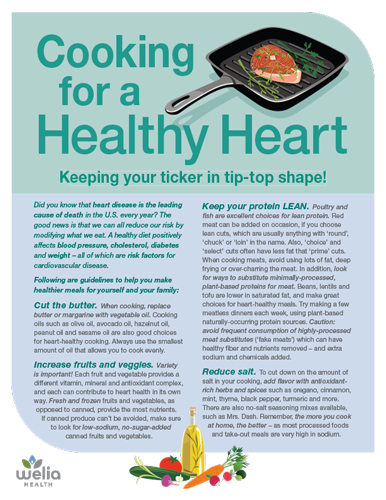Keeping your ticker in tip-top shape!
Did you know that heart disease is the leading cause of death in the U.S. every year? The good news is that we can all reduce our risk by modifying what we eat. A healthy diet positively affects blood pressure, cholesterol, diabetes, and weight – all of which are risk factors for cardiovascular disease. Following are guidelines to help you make healthier meals for yourself and your family.
Cut the butter
When cooking, replace butter or margarine with vegetable oil.
Cooking oils such as olive oil, avocado oil, hazelnut oil, peanut oil and sesame oil are also good choices for heart-healthy cooking. Always use the smallest amount of oil that allows you to cook evenly.
Increase fruits and veggies
Variety is important.
Each fruit and vegetable provides a different vitamin, mineral and antioxidant complex, and each can contribute to heart health in its own way.
Fresh and frozen fruits and vegetables, as opposed to canned, provide the most nutrients. If canned produce can’t be avoided, make sure to look for low-sodium, no-sugar-added canned fruits and vegetables.
Keep your protein lean
Poultry and fish are excellent choices for lean protein.
Red meat can be added on occasion if you choose lean cuts, which are usually anything with ‘round,’ ‘chuck’ or ‘loin’ in the name. Also, ‘choice’ and ‘select’ cuts often have less fat than ‘prime’ cuts. When cooking meats, avoid using lots of fat, deep frying, or over-charring the meat.
In addition, look for ways to substitute minimally-processed, plant-based proteins for meat. Beans, lentils and tofu are lower in saturated fat and are great choices for heart-healthy meals. Try making a few meatless dinners each week, using plant-based naturally-occurring protein sources.
Caution: avoid frequent consumption of highly-processed meat substitutes (‘fake meats’) which can have healthy fiber and nutrients removed, and extra sodium and chemicals added.
Reduce salt
To cut down on the amount of salt in your cooking, add flavor with antioxidant-rich herbs and spices such as oregano, cinnamon, mint, thyme, black pepper, turmeric and more. There are also no-salt seasoning mixes available, such as Mrs. Dash. Remember, the more you cook at home, the better – as most processed foods and take-out meals are very high in sodium.
Make food substitutions for heart-healthy cooking
| Instead of: | Try this: |
|---|---|
| All-purpose flour | Use half all-purpose flour and half 100% whole wheat flour. |
| Bacon | Turkey bacon – but make sure it is not higher in fat or sodium than the bacon you are replacing. |
| Canned fruits | Fresh or frozen fruits – if you must buy canned, canned in water is best; canned in its own juice is okay. |
| Dairy products (full fat) | Low-fat, reduced-fat, fat-free or light dairy products. NOTE: Look at the ingredient listing carefully, especially with yogurt. Fruit-flavored yogurts often add extra sugar, syrup or artificial sweeteners which can drastically reduce the health benefits of the product. |
| Deep frying | Baking, boiling, broiling, microwaving, roasting, steaming |
| Desserts | Fresh fruit with no added sugar |
| Mayonnaise | Plain, unsweetened nonfat yogurt |
| Red meat | Poultry, fish, tofu, beans, peas, lentils |
| Refined grains | 100% whole grains – whole barley, brown rice, buckwheat, whole corn, oats, whole rye, whole wheat, wild rice |
| Salt | Spices, herbs, salt-free seasonings without potassium chloride |
| Sour cream | Plain, unsweetened nonfat yogurt |
| Sugar | Reduce the amount of sugar you use – (ex: 1/4 cup instead of 1/2 cup); and add vanilla, nutmeg or cinnamon. |
| Whole milk | Unsweetened low-fat milk, skim milk, soy milk, almond milk, rice milk |
Look to the American Heart Association for heart-healthy and delicious recipes. You’ll find more mouth-watering and easy-to-follow recipes at Recipes.Heart.org.
Get cooking!
3 important things to remember:
- A healthy diet reduces heart disease risk
- Incorporate plant-based foods into your diet
- Smart substitutions make a difference















